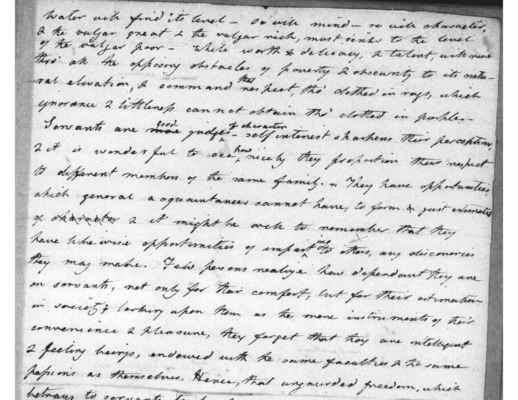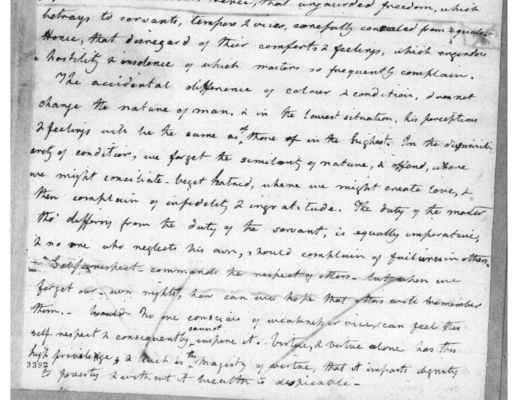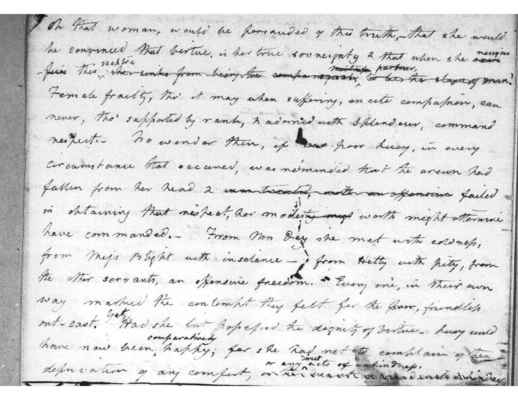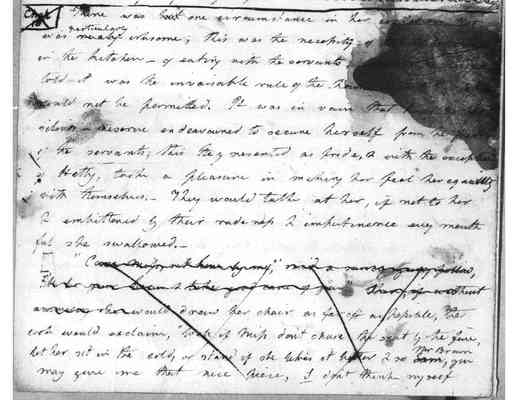Pages
26
she occasionally met with. This silence, and submissive meekness, availed her much with persons of any tenderness or feeling; it not only shielded her from insult but excited kindness and compassion, as in the case of Hetty, who now came to her aid and saved her from the encroaching and supercilious airs of Miss Blight, who like all persons of low and little minds impose on the weak and humble. No one more sensibly felt, or more clearly evinced the different feelings produced by the unassuming modesty of Lucy, and the bold freedom of Miss Blight, then Hetty--a lady's maid, is always a priviledged personage, and the master's favorite, one, that yields not even to the mistress of the family, how as both these characters were united in Hetty, she felt, and made others feel the weight of her authority. She would bear no rival, either her mistress or master and as Miss Rachel aspired to be a favorite with both, she was the object of this girl's hatred and ill will, even had she been more deserving of respect, might have failed to command it. As it was, Hetty treated her with the freedom of an equal, often indeed with the insolence of a superior-While, to the unpretending Lucy, she was kind and respectful--
27
Water will find its level--so will mind--so will character, and the vulgar great and the vulgar rich, must sink to the level of the vulgar poor--While worth, delicacy and talent, will rise thro' all the opposing obstacles of poverty and obscrurity to its natural elevation, and command that respect, tho' clothed in rags, which ignorance and littleness cannot obtain tho' clothed in purple. Servants are good judges of character--self interest sharpens their perceptions, and it is wonderful to see how nicely they proportion their respect to different members of the same family. They have opportunities, which general acquaintances cannot have, to firm and just { ?} and it might be well to remember that they have likewise opportunities of imparting to others, any discoveries they may make. Few persons realize how dependant they are on servants, not only for their comfort, but for their estimation in society; looking upon them as the mere instruments of their convenience and pleasure, they forget that they are intelligent and feeling beings, endowed with the same faculties and the same passions as themselves. Hence, that unguarded freedom, which betrays to servants
28
betrays to servants, tempers and vices, carefully concealed from equals. Hence, that disregard of their comforts and feelings, which engenders hostility and insolence of which masters so frequently complain. The accidental difference of colour and condition, does not change the nature of man, and in the lowest situation, his perceptions and feelings will be the same as of those in the highest. In the dissimilarity of condition, we forget the similarity of nature, and offend, where we might conciliate--beget hatred, where we might create love, and then complain of infidelity and ingratitude. The duty of the master tho' differing from the duty of the servant, is equally inperative, and no one who neglects his own, should complain of failures in others. Self respect commands the respect of others--but when we forget our own rights, how can we hope that others will remember them. No one conscious of weakness or vice, can feel this self respect and consequently cannot inspire it. Virtue, and virtue alone has this high privilege and such is the majesty of virtue, that it imparts dignity to poverty and without it wealth is despicable.
29
Oh that woman, would be persuaded of this truth,--that she would be convinced that Virtue, is her true sovereignty and that when she resigns this sceptre {rest of line scratched out} Female frailty, tho' it may when suffering, excite compassion, can never, tho' supported by rank, and adorned with splendour, command respect. No wonder then, if poor Lucy, in every circumstance that occurred, was reminded that the crown had fallen from her head and failed in obtaining that respect, her modesty worth might otherwise have commanded. From Mrs Dey she met with coldness, from Miss Blight with insolence,--from Hetty with pity, from the other servants, an offensive freedom. "Every one, in their own way marked the contempt they felt for the poor, friendless out-cast. Yet had she but possessed the dignity of virtue--Lucy could have now been comparatively happy, for she had not to complain of the deprivation of any comfort, or any direct acts of unkindness.
30
There was one circumstance in her condition that was particularly irksome; this was the necessity of _______________? in the kitchen--of eating with the servants ______________________? told it was the invariable rule of the house ____________________? would not be permitted. It was in vain that Lucy ____________? silence and reserve endeavoured to secure herself from the _______? of the servants, this they resented as pride, and with the exception of Hetty, took a pleasure in making her feel her equality with themselves. They would talk at her, if not to her and embittered by their rudeness and impertinence { ?} mouthful she swallowed. __________________________________________lines typed below scratched out
take good care of you." Then if without answering she would draw her chair as far off as possible, the cook would exclaim, "Well if Miss don't chuse the seat by the fire, let her sit in the cold, or stand if she likes it better and so Mr Brown, you may give me that nice piece, I don't think myself




